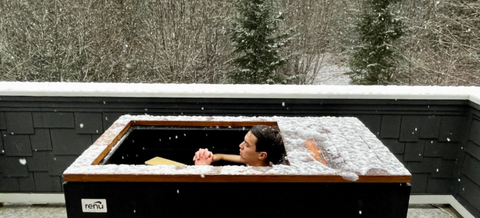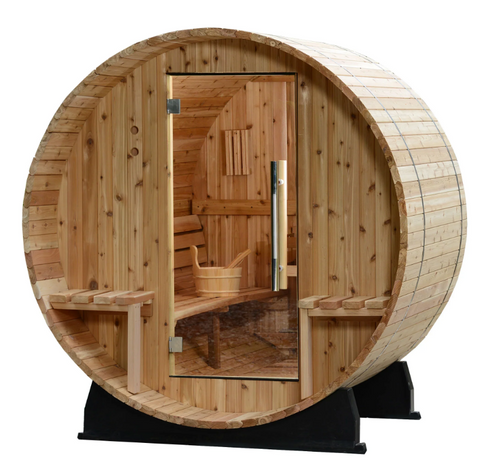Estimates indicate that in the general population, people who are age 60 and older suffer from dementia at a rate of between 5% to 8%.
With such a widespread impact, researchers are racing to find cures and treatments for dementia and other life-changing brain diseases. Fortunately, there's strong support for the case that cold therapy can help curb the effects of dementia.
Let's dig deeper to find out more.
What's the Link Between Cold Temperatures and Healthy Brains?
For many years now, anecdotal evidence has suggested a link between brain health and taking regular winter swims, often called polar bear plunge.
But now, a long-term study by Cambridge University in London of winter swimmers has found that the production of a certain protein that slows the onset of dementia in mice, also occurs in humans when exposed to cold. There's also evidence to suggest this protein can even repair existing brain damage that's due to dementia.
So what's the link between exposure to cold temperatures and the production of this highly beneficial protein for the brains of both animals and humans?
Do Cold Shock Proteins Slow Dementia?
The Cold Shock Protein—RBM3
When the role of the RNA-binding motif protein 3 (RBM3) was uncovered in other mammals, such as bears, the pathology behind its brain healing abilities began more clear.
In a 2015 study published in the journal Nature, the research team at Cambridge revealed their discovery of cold-shock chemicals while conducting studies on ordinary mice.
Mice with Alzheimer’s, and other brain afflictions such as Prion, a neurodegenerative disease.
The team observed that healthy mice that were exposed to a hypothermic state and then carefully rewarmed seemed to benefit from a resulting natural boost of RBM3 protein production. After being fully rewarmed, the researchers also found that the ordinary mice had healed neurons damaged by the initial shock.
How Was the Cold Shock Protein Discovered?
Years ago, Prof. Mallucci spoke on the BBC Radio 4- Today's morning news program and reported that she and her team had discovered a protein in mice that had been exposed to cold, and that it could prove valuable for research on treatments and cures for degenerative brain diseases.
A major quandary the Cambridge team faced was that while exposing mice to hypothermia was allowed, replicating the same in humans couldn't be a part of the research.
Thankfully, after hearing Prof. Mallucci on the BBC Radio 4 -Today program, a group of winter swimmers from London's Parliament Hill Lido contacted her and the testing began shortly after.
Five years later, the team at Cambridge University has reported that the brain-protecting protein discovered in mice exposed to extreme cold can also be found in people who take cold plunge tubs.
What Kind of Cold Therapy Helps Protect Brains?
While the research on winter swimmers is promising for brain health research teams, there's still considerable work needed to uncover what specific conditions are necessary to promote the production of the RBM3 brain-protecting cold shock protein.
Can only a cold shower spark the same process? What about cryotherapy using cold gases?
Contrast Therapy May Provide the Most Brain Benefits
Throughout hundreds of years now in Scandinavia, a routine of sauna sessions followed with cold plunges has been promoted as beneficial to health and capable of treating physical ailments.
Now, evidence from a 20-year study that included over 2,300 participants at the University of Eastern Finland by Dr. Jari Laukkanen and his colleagues, indicates regular sauna use lowered the risk for both Alzheimer’s & Dementia in the study's participants.
Today, it's easy to get contrast therapy by pairing a hot sauna with ice baths in the comfort of your home.
Can Getting Cold Be Dangerous?
There are dangers when it comes to cold water swimming, so it's important to know the warning signs that your cold water immersion is approaching safe limits.
Entering cold water is shocking to the body—it triggers a dramatic rise in heart rate and blood pressure, potentially causing a heart attack or stroke in people with underlying conditions.
There's also a risk of drowning because of the gasp reflex and rapid breathing onset by the shock of the cold water.
There are some key safety considerations when it comes to cold water immersion therapy:
- Before a cold bath therapy, ensure you're healthy and in good cardio shape. Always check with your doctor first.
- Cold plunge with a partner who knows the dangers of cold water exposure
- Get out immediately if you have trouble breathing
- After the cold plunge, do light exercise to warm back up rather than taking a hot shower
- Re-warming changes your blood pressure, so warm up slowly to prevent fainting
Invest in a Cold Tub for Polar Plunges Anytime
Reducing the likelihood of developing degenerative brain diseases like Alzheimer's and Prion disease is one of the best reasons to invest in a RENU Therapy Cold Therapy Tub for your home or office.
RENU Therapy handmakes its cold plunge tubs in the USA. We also provide the best warranty available and will do whatever it takes to provide 100% customer satisfaction!
There are multiple design options for your new cold plunge tub that will blend in beautifully wherever you install it. Each of our cold immersion tubs features a world-class design that adds to the aesthetic appeal of your home or office space.
Invest in your brain health with a cold water therapy routine, contact us at RENU Therapy today!
















